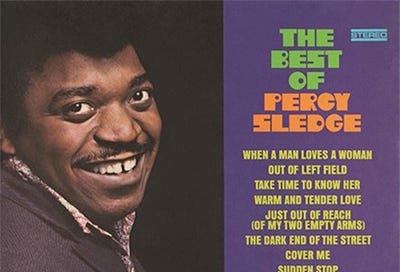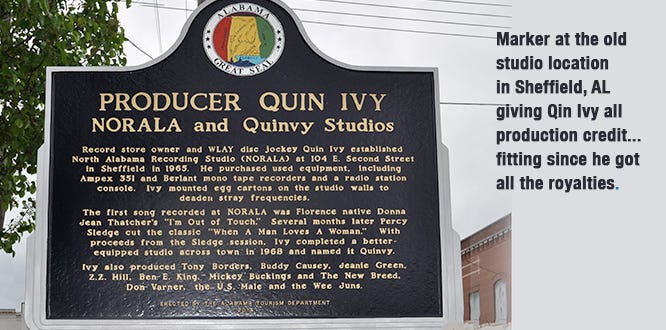When a Man Loves a Woman
There are endless stories of people losing royalties in the record biz... this is mine.
I grew up in Muscle Shoals, Alabama and was involved in the music business there for several years — from high school to 29 years old when I moved to Los Angeles. The most noteworthy project I was involved with was Percy Sledge and his recordings for Atlantic Records. People can see on the record label that I was co-producer of "When A Man Loves A Woman” but up until now few people know that I, along with Quin Ivy who was the other co-producer, also wrote the lyrics to the song. We were not credited as writers; this is the true story of why not.
Dan Penn who was writing songs and talent scouting for Rick Hall at FAME studios cut a demo for Rick to hear on Percy and his band. The lyrics on the demo were some that Percy's band had put together and they didn't impress Rick, so he passed up Percy as an artist. Dan played the demo for Quin and he agreed to talk to Percy about a recording deal. Dan Penn was the person most responsible for bringing Percy Sledge to the attention of the record world.
Quin was starting his own recording venture and had asked me to produce some projects with him. He played the demo for me and I liked what I heard but suggested we write new lyrics to the melody. Shortly afterwards, Quin and I met in my living room one Sunday and we wrote the new lyrics. In attendance were Quin, my wife at the time - Jeanie, William (Pug) Jenkins, and me. The reason I wasn’t credited as a writer on the record or copyright was so that Quin and I could publish the song. We were both signed to Fame (Rick Hall) at the time as writers. We felt that building a publishing catalog was more important than the writer's credit for one song. Quin and I had discussed that I would participate as an equal partner in the publishing company, which seemed like a good plan at the time… as they say.
We cut "When A Man Loves A Woman” in an abandoned building on East 2nd Street in Sheffield that Quin was converting into his recording studio. Everyone involved on the session raved about the record and predicted it was a hit. I never dreamed it would become an international standard. The musicians on the record were: Marlin Greene (guitar), Spooner Oldham (Farfisa organ), Albert 'Junior' Lowe (bass), Roger Hawkins (drums), Jack Peck (trumpet), Bill Cofield (tenor sax), and Don Pollard (alto sax). The vocal group was put together by Jeanie.
When he heard our recording, Rick Hall had a change of heart about Percy and sent the recording to Jerry Wexler at Atlantic Records in New York. Quin, Rick and Atlantic made a deal — "When A Man Loves A Woman” was to be released on Atlantic. I was not a party to the "deal' — I was just the guitar player.
The Second Domino Falls
The Vietnam debacle was raging at this time and I was high on the draft board's inductee list. Just days after the session I was drafted and soon I was on a bus to Fort Benning Georgia for basic training in the army. After enduring the first two weeks, all inductees were given a break and allowed contact with the outside world and freedom to go to the PX store for a much deserved break. I was walking up a dusty gravel path to the PX when I heard the sound of the record I had produced a couple weeks before. My first thought was how did they get that record and who's playing it? I rushed into the PX and there it was, already on the juke box: Percy Sledge "When A Man Loves A Woman” on the tune selector. I convinced one of the guys in my barrack to use his car to drive me into town so I could make a phone call and see what was going on. I got in touch with Jeanie and she confirmed that the record was out and already on the charts. I found a Billboard magazine at a newsstand — our record was in the top twenty with a bullet the first week. It was a "F***ing smash" as Wexler said.
I felt I could survive army basic training knowing that my world had now changed forever. I got a pass to head back to Muscle Shoals a couple weeks later to get some more tracks down on Percy. Wexler was screaming for more recordings for an LP, an opportunity not to be missed. Quin and I sorted through a stack of potential songs to record. I insisted we cut "Warm and Tender Love," a song we found in Nashville, which I thought suited Percy's vocal style perfectly. It was a follow-up hit for Percy. I was home long enough to get several songs recorded and the LP put together, then it was back to olive drab
The six months basic training eventually ended. In the mean time my friend Jimmy Johnson had pulled some strings with the local National Guard company and found that they could use my military expertise there — guess they had an opening for a guitar player. So in lieu of a regular army stint, and possibly a Vietnam experience, I enlisted in the Alabama National Guard. Jimmy had probably save my life. This would be the first of many extraordinary favors that cemented our relationship.
The dark cloud of regular army had cleared but another was on the horizon. I scheduled a meeting with Quin to get something down on paper to define what had been a verbal understanding about our relationship. Quin informed me that on the advice of his attorney, he had decided to incorporate and that an equable arrangement with me would be that I would own ten percent stock in his Norala company — production, publishing, and recording. We would split the production on Percy Sledge's records, but going forward I was the guitar player. This was not what we had talked about and verbally agreed to. I felt Quin had betrayed me but I accepted the deal. I was paid my half of the production royalty on "When A Man Loves A Woman” for first quarter sales of the single. That is the only money I have ever received from all of Percy's recording that I produced.
After that, my relationship with Quin and Norala was strained to say the least and I starting working more with Jimmy at Muscle Shoals Sound. Jimmy kindly allowed me to gradually work my way up to staff mixer for real sessions. I worked as engineer/producer with Atlantic producers Jerry Wexler and Ahmet Ertegun with numerous Atlantic artists. I was producer and engineer with many artists from other record companies as well. One project was with producer Russ Miller of Elektra Records mixing a Mickey Newberry record. After the session, Russ offered me a job in Los Angeles at Elektra. For business as well as personal reasons I was ready to move on, so I accepted the job offer. When Quin heard about my decision he reasoned that it would leave his new company (now Norala Recording Corp) financially and musically penalized if I abandoned his operation and left Muscle Shoals. He demanded that I give up all future production royalties to compensate him. Without benefit of legal advise I agreed. There were many reason why I made such a shortsighted and costly decision which I won’t go into here. Mainly, I was young, inexperienced and naive about the music business, and I thought the Elektra offer was a great opportunity.
I will relate one episode that is revealing about the culture of Alabama business — music or otherwise — at the time and that reinforced my decision to leave. I was not a great weed enthusiast but I would indulge occasionally. It was, and still is, a felony to possess cannabis in Alabama. I had a few plants growing in the woods near my house. My good friend and the accountant at Quin's studio, William (Pug) Jenkins, had expressed his desire to have a couple of plants in his apartment, so I gave him three small plants I had started in coffee cans. They were growing happily at his place until some visitor noticed them and informed the sheriff. Front page news: sheriff and deputies break down front door to confiscate illegal drugs - Jenkins arrested. I immediately drove to the Norala office and confronted Quin and insisted that we must defend Pug and get him out of jail. Quin replied, "Marlin I can't do that. If I do they will throw me out of the Country Club." I was stunned. I told Quin I was never working with him again and I wanted out of our agreement. He said fine and he came up with the forfeiture of all future royalties plan. I gave up a small fortune, but nevertheless that was the decision I made.
I produced the first number one single Atlantic Records ever had: “When a Man Loves a Woman.” I also co-wrote the lyrics but was never rewarded for producing or writing the song. Being involved with Quin did change my life and for that I am grateful. I lost the royalties but maybe Quin did me a favor by forcing me to move on to other priceless adventures.





